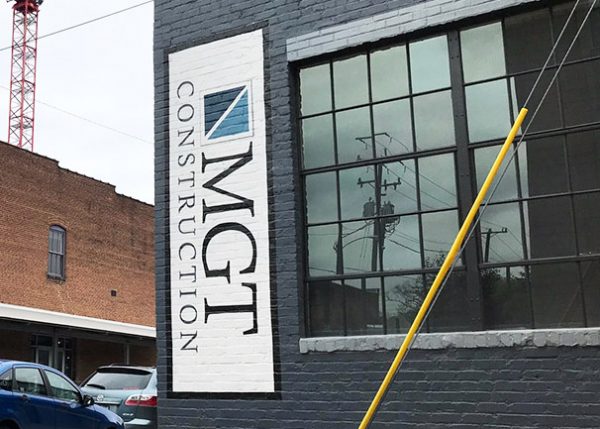Local real estate firm Thalhimer has a struck a deal to further rid itself of future liability related to the collapse last year of its general contracting subsidiary MGT Construction.
The company this week entered into a settlement with the trustee overseeing MGT’s bankruptcy case, with an agreement that calls for Thalhimer and one of its insurance policies to pay a total of $1.5 million into the MGT bankruptcy estate.
Of that total, $800,000 will be paid by an insurance policy held by Thalhimer, while the remaining $700,000 will be paid directly from Thalhimer.
The deal is the result of a nine-hour mediation session held between the parties on Oct. 8, prompted by demand letters sent last year by the trustee to former MGT directors, some of whom are still executives at Thalhimer.
The demand letters threatened potential litigation, but no lawsuits were filed.
The parties agreed to mediation and settlement nevertheless, with the aim of finally putting the matter to rest. The settlement, which still must be approved by the bankruptcy court, prevents the trustee from pursuing any future civil claims against Thalhimer and any former MGT employees or directors.
“The company seeks finality on MGT Construction related matters,” Thalhimer CEO Lee Warfield said in an email to BizSense. “Getting into protracted litigation with the trustee is both a waste of time and money.
“The amount paid is a fraction of the cost of litigation. It’s time to put this completely behind us and eliminate distractions and uncertainty,” he said.
If approved by the judge, the settlement would conclude the second of two long-lingering legal matters that have hung over Thalhimer since MGT toppled in February 2018 in the wake of a multimillion-dollar accounting scheme allegedly perpetrated by at least two former MGT employee.
The first of those was resolved earlier this year when Thalhimer insurance policies paid $1.75 million in a settlement with Steven Brincefield, who retired from the company in 2012 as head of property management. Brincefield sued his former employer in 2017, claiming its leadership was to blame for a previous decline in the value of its employee stock ownership plan, which he alleged was due in part to the financial troubles and an accounting scheme at MGT.
Thalhimer denied the allegations from the outset, claiming Brincefield’s case had no merit and was fueled by “conspiracy theories and unabashed rage.”
The settlement allowed Thalhimer to end the case without fault being found on either side.
Dropping debt claims
A notable provision of this latest settlement with the MGT estate is the agreement by Thalhimer and Hartford Insurance to drop their debt claims in the ongoing MGT bankruptcy process, which could be good news for MGT’s remaining creditors.
Hartford, which provided insurance bonds on many MGT construction projects, claimed it was owed potentially as much as $68 million. That made it the largest creditor in the case by far.
Thalhimer was next in line, claiming it was owed $15 million, money that it said it put into MGT to try to prop up the then-faltering subsidiary and prevent its collapse after the accounting scheme and financial troubles were fully discovered.
By eliminating that combined $83 million in debt claims, only about $15 million worth remains from other creditors, court records show. There had been debt claims of as much as $102 million earlier in the case.
That improves the chances for the dozens of MGT’s smaller creditors – including many subcontractors who were left unpaid on work performed – of recouping some money back after the trustee digs for more assets. That digging process will continue for some time and hasn’t yet resulted in any distributions back to creditors.
The settlement also frees Thalhimer to potentially pursue claims against certain firms that provided it legal and accounting services prior to MGT’s collapse. Thalhimer had previously sued Richmond accounting giant Cherry Bekaert in local circuit court, claiming it was partly to blame for not catching problems at MGT. That case has been on hold while the bankruptcy played out.
Warfield reiterated that the settlement is “a weight off everyone’s shoulders.”
“The settlement allows Thalhimer to move on and continue to focus on what matters most, our clients and our 400+ associates,” he said.
Besides the ongoing liquidation of MGT, the only other lingering, unknown chapter in the story is to what extent federal authorities continue to investigate the accounting scheme that brought down MGT.
BizSense reported earlier this year that the FBI, IRS and U.S. Postal Service began gathering evidence and questioning former MGT employees, as well as current and former Thalhimer employees, for a potential criminal case.
No charges have resulted.
The scam, court records show, related to at least two MGT employees shifting expenses across various construction jobs in order to hide losses, inflate profits and boost bonuses of three main MGT employees from 2013 to 2016.
Thalhimer has said in court filings that it discovered the scam after it was too late and it resulted in losses upwards of $30 million for Thalhimer as the parent company.
Warfield said he would not comment on the status of the federal investigation.
Local real estate firm Thalhimer has a struck a deal to further rid itself of future liability related to the collapse last year of its general contracting subsidiary MGT Construction.
The company this week entered into a settlement with the trustee overseeing MGT’s bankruptcy case, with an agreement that calls for Thalhimer and one of its insurance policies to pay a total of $1.5 million into the MGT bankruptcy estate.
Of that total, $800,000 will be paid by an insurance policy held by Thalhimer, while the remaining $700,000 will be paid directly from Thalhimer.
The deal is the result of a nine-hour mediation session held between the parties on Oct. 8, prompted by demand letters sent last year by the trustee to former MGT directors, some of whom are still executives at Thalhimer.
The demand letters threatened potential litigation, but no lawsuits were filed.
The parties agreed to mediation and settlement nevertheless, with the aim of finally putting the matter to rest. The settlement, which still must be approved by the bankruptcy court, prevents the trustee from pursuing any future civil claims against Thalhimer and any former MGT employees or directors.
“The company seeks finality on MGT Construction related matters,” Thalhimer CEO Lee Warfield said in an email to BizSense. “Getting into protracted litigation with the trustee is both a waste of time and money.
“The amount paid is a fraction of the cost of litigation. It’s time to put this completely behind us and eliminate distractions and uncertainty,” he said.
If approved by the judge, the settlement would conclude the second of two long-lingering legal matters that have hung over Thalhimer since MGT toppled in February 2018 in the wake of a multimillion-dollar accounting scheme allegedly perpetrated by at least two former MGT employee.
The first of those was resolved earlier this year when Thalhimer insurance policies paid $1.75 million in a settlement with Steven Brincefield, who retired from the company in 2012 as head of property management. Brincefield sued his former employer in 2017, claiming its leadership was to blame for a previous decline in the value of its employee stock ownership plan, which he alleged was due in part to the financial troubles and an accounting scheme at MGT.
Thalhimer denied the allegations from the outset, claiming Brincefield’s case had no merit and was fueled by “conspiracy theories and unabashed rage.”
The settlement allowed Thalhimer to end the case without fault being found on either side.
Dropping debt claims
A notable provision of this latest settlement with the MGT estate is the agreement by Thalhimer and Hartford Insurance to drop their debt claims in the ongoing MGT bankruptcy process, which could be good news for MGT’s remaining creditors.
Hartford, which provided insurance bonds on many MGT construction projects, claimed it was owed potentially as much as $68 million. That made it the largest creditor in the case by far.
Thalhimer was next in line, claiming it was owed $15 million, money that it said it put into MGT to try to prop up the then-faltering subsidiary and prevent its collapse after the accounting scheme and financial troubles were fully discovered.
By eliminating that combined $83 million in debt claims, only about $15 million worth remains from other creditors, court records show. There had been debt claims of as much as $102 million earlier in the case.
That improves the chances for the dozens of MGT’s smaller creditors – including many subcontractors who were left unpaid on work performed – of recouping some money back after the trustee digs for more assets. That digging process will continue for some time and hasn’t yet resulted in any distributions back to creditors.
The settlement also frees Thalhimer to potentially pursue claims against certain firms that provided it legal and accounting services prior to MGT’s collapse. Thalhimer had previously sued Richmond accounting giant Cherry Bekaert in local circuit court, claiming it was partly to blame for not catching problems at MGT. That case has been on hold while the bankruptcy played out.
Warfield reiterated that the settlement is “a weight off everyone’s shoulders.”
“The settlement allows Thalhimer to move on and continue to focus on what matters most, our clients and our 400+ associates,” he said.
Besides the ongoing liquidation of MGT, the only other lingering, unknown chapter in the story is to what extent federal authorities continue to investigate the accounting scheme that brought down MGT.
BizSense reported earlier this year that the FBI, IRS and U.S. Postal Service began gathering evidence and questioning former MGT employees, as well as current and former Thalhimer employees, for a potential criminal case.
No charges have resulted.
The scam, court records show, related to at least two MGT employees shifting expenses across various construction jobs in order to hide losses, inflate profits and boost bonuses of three main MGT employees from 2013 to 2016.
Thalhimer has said in court filings that it discovered the scam after it was too late and it resulted in losses upwards of $30 million for Thalhimer as the parent company.
Warfield said he would not comment on the status of the federal investigation.




